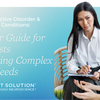How You Can Easily Get Your Mental Health In Check

Have you been neglecting to prioritize your mental health? You might be a busy mom who has been focusing on the kids, your career, cleaning the house, and cooking tonight’s dinner. It can be challenging for you to focus on your mental health with all that is going on. Whether you're a mom with a couple of kids, a busy young professional, or someone who has put their mental well-being on the back burner, it is time to change that habit.
There are many ways you can get your mental health in check, it’s not as complicated or intimidating as it may seem. With mental health being less of a taboo subject these days it has opened up numerous resources for you to utilize. If you want to improve your emotional well-being, read on to discover some tips that will help you out.
Manage Your Stress
Everyone can experience stress at some point in their life. What’s important is how you manage your stress. When stress isn’t managed properly it can lead to severe health and heart problems. You could be at risk for heart attacks, heart disease, or high blood pressure if you are too stressed. Therefore it is important to get your stress under control and start looking for ways you can decrease the amount of daily stress you endure.
Too much stress can have an impact on your mental well-being in addition to your physical health. Stress overload can directly affect your sympathetic nervous system and put you in your flight or fight state. Because stress can impact not only your mental health but your sleep and your ability to focus finding a solution that helps you be stress-free is a priority.
There are many ways you can manage your stress levels. You can practice breathing exercises and participate in a guided mediation. An easy and convenient way to start practicing guided meditation is by using an app like Calm. Apps like these allow easy access to meditation exercises. You can also exercise regularly to relieve stress. Not only is exercising a great way to relieve stress but it helps to keep you physically fit and healthy. A unique approach to managing stress would be to try science-backed stress relieving technology. TouchPoints’ wearable stress-relieving wrist bands emit gentle vibrations to counteract stress and activate your calm response. These stress management techniques are easy ways to reduce the negative effects of stress on you and your mental well-being.
Talk About Your Issues
If you are enduring daily stressors or if you are experiencing anxiety or depression it could be helpful for you to find someone to talk to. Friends and family are good people to talk to when you need to get something off your chest. They will be able to comfort you in times of stress and can help give you actionable advice. The people you confide in might also be going through a similar situation. Talking with friends and family that are experiencing the same struggles can help you to identify the challenges you are encountering. Another option is to attend a support group. Support group participants are all there for similar reasons and are going through similar situations. For example, if you recently experienced a loss of a loved one, a support group for grief counseling could be a good option for you.
On the other hand, you may not feel comfortable in a group setting or talking to your close friends and family. The good news is, that there are other options conveniently available for you to utilize. If you would like to speak with a licensed professional you can try counseling through online therapy. These mental health professionals will be able to help you find peace of mind and balance your mental well-being with your everyday lifestyle. Seeing a therapist can greatly improve your overall emotional state and mental wellness journey.
Practice Self-Care
Practicing self-care is a great way to reset your mental health, especially if you have had a rough day or week. Taking time for yourself and giving yourself the opportunity to reflect, relax and reset is crucial to having a positive mental health journey. Self-care comes in many shapes and forms and it is important to personalize your routine to fit your needs and interests. It is up to you on how you want to practice self-care. From getting your hands dirty and planting some flowers in the garden, to reading a book on your front porch, to soaking in the tub with a face mask, all are versions of self-care that give you the chance to solely focus on the task at hand and how you feel while doing it.
Taking this time and stepping away from whatever may be causing you stress or anxiety is a simple and effective way to refresh. It’s incredibly important for you to not only practice self-care when you might feel overwhelmed or burnt out, but regularly scheduling blocks of time for self-care during the week is an easy way to practice healthy mental wellness strategies. Whatever you decide to do for self-care be sure that it brings you peace and joy, so you can truly benefit from this time you set aside.
Have a Positive Mindset
If you find yourself thinking negative thoughts throughout the day, it’s time to change your mindset. Thinking positively can help you to change your outlook on life. An easy way to do this is by starting off your day by writing down some positive affirmations and things you are grateful for. Practicing gratitude daily will help you whenever you face difficult situations. Reflect in a journal at the end of the day by writing down anything positive that happened or things you do that made you proud of yourself.
Shifting your outlook on life will allow you to have a growth mindset which is key when you’re on a mental health journey. With some hard work and determination, you will be able to accomplish the things you set your mind to and come out successful. Believing you can do this is what a growth mindset is. The basic abilities you possess have the potential to contribute to something bigger and better. By embracing the challenges and obstacles you face every day you will come out stronger on the other side.
Be Self-Aware
Whenever you feel stressed out or anxious you may notice the triggers you are experiencing before feeling those emotions. Knowing the common emotional signs of mental health issues and understanding your triggers are extremely important. If you are experiencing anxiety knowing the certain triggers that can cause panic attacks or anxious thoughts is helpful so you can be self-aware. Once you recognize these emotions you can find effective coping mechanisms that work for you. Before trying to manage your emotions and jumping right into your coping strategies, it’s important to recognize the feeling you are feeling and accept the emotions you are going through. Then you can move on to your coping strategies.
There are many different coping strategies that are simple enough for anyone to try out. Breathing exercises are a great way to cope with feelings of anxiety or when you feel overwhelmed. Breathing allows your body to relax in whatever state it is in. There are several different breathing techniques that you can try. From deep breathing to alternate nostril breathing, to belly breathing these breathing techniques will help you to relax when you are feeling overwhelmed by stress and anxiety.
Another common coping mechanism, especially for anxiety is grounding techniques. A frequent physical grounding technique suggested by medical professionals is the “5,4,3,2,1 Technique.” According to the University of Rochester Medical Center, this is what the “5,4,3,2,1 Technique” looks like:
- 5: Acknowledge FIVE things you see around you.
- 4: Acknowledge FOUR things you can touch around you.
- 3: Acknowledge THREE things you hear.
- 2: Acknowledge TWO things you can smell.
- 1: Acknowledge ONE thing you can taste.
Other coping strategies include stimulating your senses by holding an ice cube or using essential oils. Stretching your body and releasing the tension built up in your muscles is also another way to cope with built-up stress and anxiety.
With a little research, and some trial and error you’ll be able to choose the best ways for you to manage your mental health. Whether you decide to talk to a professional, manage your stress better or change your mindset you will see an improvement in your overall mental well-being. Learning how to cope with your mental health struggles will set you up for better days ahead and improve your quality of life. Use these tips to figure out which is the easiest way for you to get your mental health in check.




